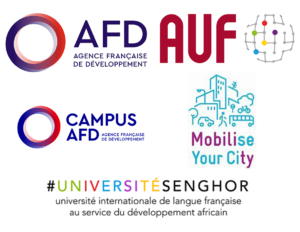
MOOC “Urban Mobility in Africa”
Type of diploma
Follow-up certificate, possibility of paying certification fee of 60 euros (2 ECTS) for the 2020 and 2022 sessions
Target audience
- Technicians in charge of transport and urban mobility projects
- Senior managers and decision-makers
- Students
- Civil society, associations
Partners
- CODATU
- Senghor University
- AFD Campus
- Agence Française de Développement (AFD)
- AUF
- MobiliseYourCity
Key figures
- 2 training sessions in 2020 and 2022
More than 5,500 registered auditors
Periodicity
- Replicable on demand
- MOOC videos freely available on AFD’s platform: https://mooc-campus.afd.fr
Teaching device and method
Distance learning with the possibility of being delivered synchronously (opening a session on a training platform) or asynchronously.
The course videos are supplemented by pedagogical summaries, testimonial videos, documentary references, quizzes and exchange sessions with experts in the form of webinars in the context of synchronous training systems.
Since 2022, the course videos are available in English subtitled version, and the pedagogical summaries and bibliographical references are also available in English.
Pedagogical and technical means
Model
The course is divided into 5 teaching units (average duration 10 hours):
- UE 1The challenges of urban mobility in African cities
- UE 2Demand and supply: services, operators, regulation
- UE 3Organising authorities and mobility planning
- UE 4Financing sustainable urban mobility
- UE 5Project management of urban mobility investment projects
Expected skills
- Understand the challenges of urban mobility in African cities;
- Characterise the supply of transport and demand for mobility in African cities, the actors that influence them, and their regulation;
- Understand the functions of transport authorities, and in particular their importance in carrying out integrated transport and urban planning measures;
- Assessing the appropriate funding mechanisms for different types of transport activity, projects and actors, and how they might evolve;
- Assessing why, how and when to establish project ownership; assessing key issues and areas of concern from other cases.
